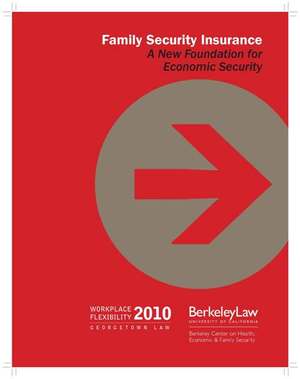New Report Provides Blueprint to Create Family Security Insurance

Berkeley Law and Georgetown Law have released a report that provides a blueprint for establishing and financing a new national insurance program that would replace wages when people need to take time off for health and care-giving needs.
The report, by the Berkeley Center on Health, Economic & Family Security (Berkeley CHEFS) and Georgetown Law’s Workplace Flexibility 2010, is called “Family Security Insurance: A New Foundation for Economic Security” and is available here.
Based on a substantive review of current data, law, and policy, the report outlines a nearly universal need among working Americans for time off from work to address personal illness, care for a new child, or care for a loved one with a serious illness. It asserts that this need is no longer an issue for individual families or select industries, but a national priority with major social and economic implications.
“The report describes how Family Security Insurance would fundamentally reform social policy to address workers’ critical needs,” said Berkeley CHEFS Executive Director Ann O’Leary ’05. “At the same time, it would spread the cost fairly, protect the deficit, and keep people working.”
O’Leary co-authored the report with Berkeley Law Professors Stephen Sugarman and Gillian Lester, Berkeley CHEFS Counsel Angela Clements '09, and members of the Georgetown Law faculty. On December 2 at the National Press Club in Washington, D.C., O’Leary, Sugarman, and Lester helped launch the report by appearing on a panel with two Georgetown colleagues to discuss the proposal’s key items.
Family Security Insurance would reform the current social insurance system to provide for income replacement when people take time off from work for health and care-giving reasons. The report outlines the benefits that would be provided, who would be eligible, how the program would be administered, and how to fund it.
The recommendations cover income replacement for three important life events: one’s own serious illness or temporary disability that renders a worker temporarily unable to perform his or her job; arrival of a child who needs care and time to bond with parents; and the serious illness of a family member who needs care.
Family Security Insurance would be a national social insurance program not paid for by the government, but by spreading the cost among workers and their employers to create a fair, predictable foundation of support.
“Spreading the costs between employers and employees is fair because both will benefit from Family Security Insurance,” said Sugarman. “Employers will be more able to retain good workers and employees will receive a basic level of economic security when they need to be temporarily away from the workforce. Having employers and employees pay for Family Security Insurance will also ensure that it's not a government funded welfare program that would add to the national deficit.”
